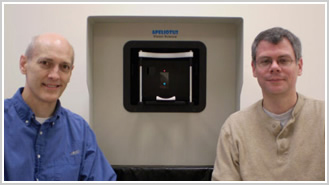 Imagine you are staring at the mini-blinds in your living room. Suddenly, the blinds appear wavy and tilted. Some rows disappear all together. You open the blinds and as the bright light hits your face, you are blinded for what seems like far too long. Unless you followed the Grateful Dead for 30 years, this is not an acid flashback. This is how many older patients discover age-related macular degeneration, a condition where the retina becomes detached from its blood supply. As the leading cause of functional blindness in the U.S., Macular degeneration strikes patients 55 or older and can result in blurred vision to almost complete vision loss. From looking through the blinds to going blind, one thing is for sure: macular degeneration is a nasty disease.
Imagine you are staring at the mini-blinds in your living room. Suddenly, the blinds appear wavy and tilted. Some rows disappear all together. You open the blinds and as the bright light hits your face, you are blinded for what seems like far too long. Unless you followed the Grateful Dead for 30 years, this is not an acid flashback. This is how many older patients discover age-related macular degeneration, a condition where the retina becomes detached from its blood supply. As the leading cause of functional blindness in the U.S., Macular degeneration strikes patients 55 or older and can result in blurred vision to almost complete vision loss. From looking through the blinds to going blind, one thing is for sure: macular degeneration is a nasty disease.
While the onset of blindness may come on very quickly–some patients go from 20/20 vision to near blindness in less than six months–macular generation is actually a slowly developing ailment. Although progression of the disease is preventable using a regiment of vitamins and antioxidants, symptoms may not be felt for five years after the disease begins forming. And by then it is too late. This distinction led the vision experts at Apeliotus Vision to search for a better treatment that might prevent the above scenario from playing out in your living room someday. Their diagnostic treatment, ADAPTDx, is a retinal scan test for MD. The scan has passed the first testing rounds testing and, earlier this summer, the company received $200,000 in the most recent Ben Franklin Technology Partners funding round to help Apelliotus prepare as ADAPTDx heads toward FDA approval.
“This disease is extremely common, striking one in six people over 65 and one in three people over 75 but usually testing doesn’t begin until that later stage because there is no test for it early on,” says Apeliotus CEO John Edwards. “The way we envision this working is as a routine occular screening test for anyone over age 50.”
With the addition of the Ben Franklin grant, Apeliotus begins the long process of applying for FDA approval, submitting data and prototyping their commercialized product. The device–a large box akin to a viewfinder–has been tested and developed for distribution but development professionals now must engineer the product to lower manufacturing costs. Apeliotus expects to have the product through FDA approval by March and be peeking at peepers by next fall. Edwards believes production can’t come fast enough for a disease that is both wholly debilitating and 100 percent treatable.
“Functional blindness completely changes your ability to have a normal life,” says Edwards. “Imagine you can’t read, you can’t drive, you can’t watch television, you can’t recognize faces. And 13 million people in the U.S. and 30 million people worldwide have this disease where you are dependent on other people to do simple things for you like take you to the grocery store and read the newspaper for you. If you are fortunate enough to arrest it in the early stages, you can have 20/20 vision. Either you catch it before you go blind or you go blind. Its as simple as that.”
Source: John Edwards, Apeliotus Vision
Writer: John Steele